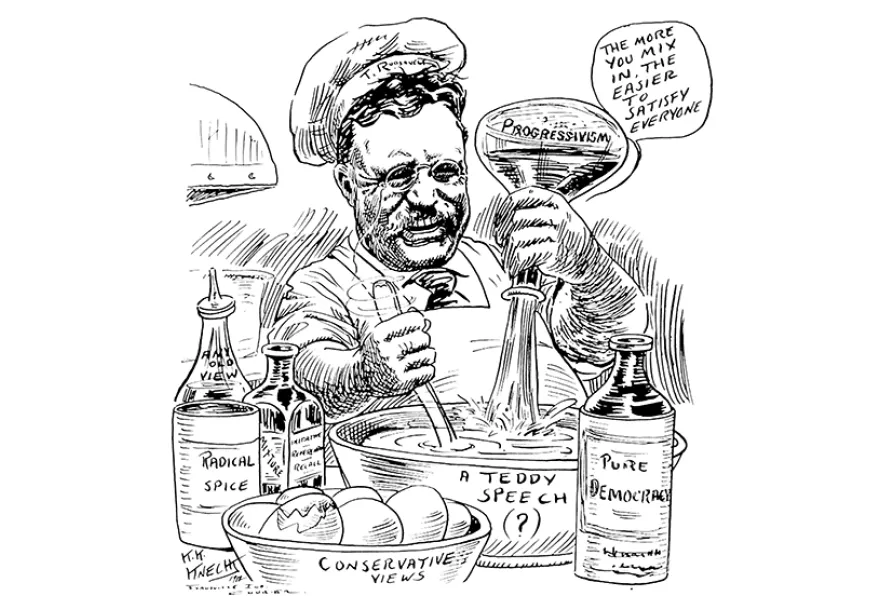The Mandelson scandal reveals a political settlement in which democratic choice is curtailed and the power of markets eclipses the will of voters – only the left can challenge this, writes JON TRICKETT MP
STEPHEN ARNELL casts a critical eye over the sudden rash of challenges to the two-party system on both sides of the Atlantic, noting that today’s performative populist politics sadly lacks Roosevelt’s progressive ‘Bull Moose’ vision of the early 20th century

 Roosevelt mixing ideologies in his speeches in this 1912 editorial cartoon by Karl K Kneecht (1883–1972)
Roosevelt mixing ideologies in his speeches in this 1912 editorial cartoon by Karl K Kneecht (1883–1972)
RECENT weeks have seen the emergence of new challengers to dominating two-party systems, both in the US and here in Britain; are we seeing, in the words of Tony Blair (admittedly in relation to September 11 2001) a situation where “the kaleidoscope has been shaken, the pieces are in flux, soon they will settle again”?
“Independence Day is the perfect time to ask if you want independence from the two-party (some would say uniparty) system!” — Elon Musk.
Mercurial billionaire Elon Musk proclaimed his America Party as a challenge to the Republicans and Democrats, but this appeared to be merely a Big Beautiful Bill-related tantrum against the president, of whom he adoringly said, earlier in the year, “I love@realDonaldTrump as much as a straight man can love another man.”
In early August, Musk contributed $15 million to the coffers of Trump-supporting super PACs, so presumably he’s either going to fold, or at least hedge his bets and wait on events — perhaps looking to see how L’affaire Epstein pans out.
“It’s time for a new kind of political party — one that belongs to you.” — Jeremy Corbyn and Zarah Sultana.
In Britain, we have, of course, seen the rise of the hard-right Reform Party, which began in 2018, but only gained rocket-boosters when Nigel Farage installed himself as jefe in November 2024.
In a reaction from the left to what they perceived as the backsliding of Keir Starmer’s somewhat milquetoast administration, a new, as yet unnamed, party is said to soon be emerging, providing a genuine socialist alternative to Labour, and a bulwark against the nationalist populism of Farage and his fawning myrmidons.
And to be fair, the over-represented Scots Nationalists have performed an outsized role in the traditionally two-party dominated Westminster Parliament until their drubbing last year, although Commons SNP leader Stephen Flynn remains as one of the few effective speakers in that august body.
People tend to ignore the Liberal Democrats, who have been around in various guises since at least the Glorious Revolution of 1688, when they were the Whigs, but who experienced a revival in 2024, now boasting 72 seats in Parliament, having made serious inroads into the traditional Tory Home Counties and rural West Country.
The Lib Dems are just 48 seats below the Tories (120), who in turn fall a whopping 278 below Labour (398).
“Ladies and gentlemen, I don’t know whether you fully understand that I have just been shot, but it takes more than that to kill a Bull Moose” — Theodore Roosevelt.
Musk’s supposed, possibly purely performative plans for a new US party bear scant comparison to former president Teddy Roosevelt’s vastly different, progressive Bull Moose Party (1912-20). So named after Roosevelt boasted after being shot (he felt he was still “strong as a bull moose” or words to that effect) and losing the Republican 1912 nomination for president against his former protege, the incumbent president William Howard Taft.
The eight-year life of the Bull Moose party was a fascinating combination of Roosevelt’s various motives, both personal and political; namely ego, thwarted ambition, suspected betrayal by his former Republican colleagues, and a genuine desire for a system untethered to either big business (the Republicans) or Southern racism (the Democrats of the old Confederacy).
The Bull Moose platform included restricting campaign finance contributions, reducing tariffs, an inheritance tax, recall elections, referendums, establishing a social insurance system, an eight-hour working day, farm aid, old age pensions and not least, women’s suffrage. Markedly progressive even today, especially when compared to Trump in the US, and his mini-me, Farage, here in Britain.
In the 1912 election, Roosevelt garnered 27.4 per cent of the popular vote compared to Republican nominee Taft’s 23.2 per cent, but both finished well behind Democrat Party nominee Woodrow Wilson, who took 41.8 per cent and the vast majority of electoral votes.
Roosevelt’s death from a pulmonary embolism in 1919 at the age of 60, and his declining interest after 1912, took much of the remaining wind out of progressivism’s sails; that is, until his fifth cousin, Franklin D Roosevelt, became president in 1933.
In the 1992 US presidential election, populist independent Ross Perot won an impressive 18.9 per cent of the popular vote, the highest for a third-party candidate since Roosevelt in 1912, against 37.5 per cent for sitting president George HW Bush and 43 per cent for winner Bill Clinton.
Perot’s policies bore some perhaps surprising resemblance to Roosevelt’s Bull Moose, with a platform in favour of a comprehensive national healthcare plan, anti-corporate corruption, pro-education, support for abortion and a wealth tax.
All thoroughly un-Trumpian.

HANK KENNEDY contends that US military attacks in the Caribbean amount to modern piracy driven by Venezuela’s oil wealth

With Reform UK surging and Labour determined not to offer anything different from the status quo, a clear opportunity opens for the left, argues CLAUDIA WEBBE












